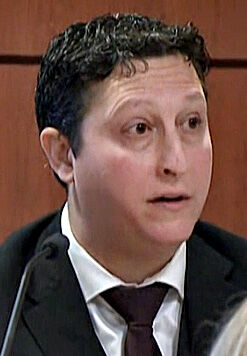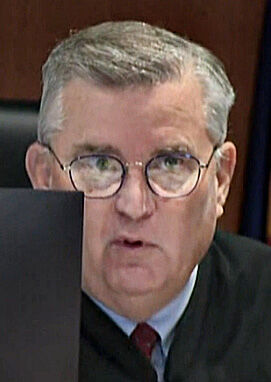PHOENIX — A pollster testified Thursday he thinks Republican Kari Lake would have won the governor’s race except for problems at vote centers in Maricopa County. A political science professor who specializes in election issues told the judge that’s “pure speculation.’’
The conflicting testimony came on the second day of the two-day trial on Lake’s bid to have a Maricopa County judge declare her the winner or to force a new vote in the state’s largest county.
But even if the judge accepts the computations of Richard Baris, the pollster who testified for Lake, that doesn’t mean she will prevail.
Lake also has to show that the Election Day problems were intentional, versus simple mistakes or errors, and that intentional acts affected the outcome. Even Baris acknowledged he has no evidence to support such a conclusion.
Barris estimated that about up to 40,000 people who intended to vote did not. He attributed that to them being deterred by what they were seeing in person or hearing on the media about long lines at some polling places.
Baris, director of Big Data Poll, said Republicans are more likely to go to the polls on Election Day and that the results from those who did vote that day skewed heavily for Lake. Extrapolating that, he said, would mean most of those missing votes would have gone for the Republican contender.
But he conceded he could not determine how much of the decision by people not to vote, if any, was related to issues with the printers and tabulators — the issues Lake claims were caused by intentional actions by someone connected with the election. In fact, he said some people who previously told him they were going to vote may not have completed the process due to some totally unrelated problems, like finding they forgot their voter identification when they got to the polls.
Kenneth Mayer, a University of Wisconsin political science professor testifying on behalf of the county and Democratic Gov-elect Katie Hobbs, said there is a series of issues with the assumptions Baris used to theorize why people didn’t vote which, in turn, undermined his conclusion those problems would have affected the election outcome.
The final tally showed Hobbs defeating Lake by 17,117 votes.
Baris testified that Lake took at least 70% of the votes of the approximately 250,000 Maricopa County residents who went to the polls on Election Day. He said those who waited until that day to cast their ballots were far more likely to vote a “straight ticket.’’
Had those deterred Election Day voters been able to cast a ballot, Baris said, “it would be significant enough to change the leader of the race.”
He based this on his polling methodology of contacting Maricopa County voters before the election who said they intended to vote on Nov. 8 and agreed to contact him afterwards.
Normally, he said, between 250 and 300 people would respond. This time it was 160 for Election Day voters, which Baris said was an unprecedentedly low return. “There’s no explanation for why these voters didn’t call back,’’ he said.
That led him to his conclusion that close to 40,000 more people would have cast ballots on Election Day — and that applying that 70% figure to them, the Lake-Hobbs break of those who voted that day, would have given Lake the lead.
Mayer, however, said that’s making a rash assumption based on the failure of people to respond.
“People often say they’re going to vote and don’t vote,’’ he said. If there was a sharp increase in the number of people who didn’t call the pollster back, it might be because there were problems with the way he chose his sample, Mayer said.
Attorneys for the county and Hobbs also got Baris to acknowledge that, in his interviews with people who did vote and did follow up, the only thing he could determine is that they encountered some issue.
He did not ask what percentage of those people encountered a line, or even how long a line they faced.
Still, Baris insisted that issues with tabulators affected the turnout as people saw news reports or heard from friends.
“There were widespread issues and that deterred people from voting,’’ Baris said, as did “long lines people couldn’t wait in.’’
“Not everyone is so intense about politics that life can’t be put aside,’’ he said. “Life gets in the way.’’
Mayer, however, said Baris has no basis for his conclusions about why people didn’t vote.
“He’s assuming that every person in his poll who didn’t respond to his poll didn’t vote because there were tabulator problems,’’ he said. “And there are about five logical leaps that he would have to go through to get from that premise to the conclusion. It’s just a series of assumptions and speculation.’’
Lalitha Madduri, an attorney for Hobbs, got Baris to admit that his firm is rated “F” by FiveThirtyEight, an organization that aggregates other local and national polls, and Big Data’s results are not included in its reports. Real Clear Politics, which reports on various polls, also does not include his company, he said.
On the waiting times, Mayer said the issues with lines were not as serious as claimed.
He cited figures produced by the county showing that 7% of vote centers recorded waiting times of more than an hour, with three-quarters posting wait times of less than 30 minutes.
There is no question there were problems at some voting centers.
Tabulators were not reading some of the ballots being printed out. County officials blamed that on printer settings.
And Scott Jarrett, the county’s co-election director, said workers at three sites, trying to fix the problem, reset printers to a “fit-to-paper’’ setting which resulted in those ballots being rejected by tabulators.
An attorney for Lake, Kurt Olson, told Maricopa County Superior Court Judge Peter Thompson said that’s not true. He said an examination of a random sample of ballots found undersized ballots at at least six voting centers.
But Jarrett also testified that, whatever the printer problems, voters had options other than repeatedly trying to feed their ballots into the tabulators, including putting them into a sealed box to be counted later. He also said voters were told of nearby locations where waiting times were not as long.
Jarrett also detailed the procedures the county uses to track ballots, a move designed to counter claims made Wednesday by an investigator hired by Lake’s legal team that chain-of-custody laws were not followed, opening the door to ballots being added or subtracted.
The judge did not say when he will rule.
In a speech to a crowd of young conservative activists in Phoenix Sunday, Dec. 18, 2022, Republican Kari Lake alleged again that her election loss to Democrat Katie Hobbs was illegitimate. She called Maricopa County a "house of cards" and said "we're going to burn it to the ground."









